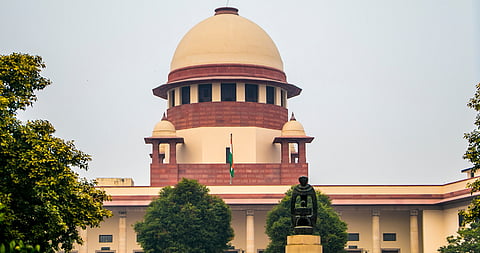

The Supreme Court on Tuesday, April 9, issued a notice in a Public Interest Litigation (PIL) seeking urgent reforms to ensure transparency and fairness in the assessment and accreditation of Higher Education Institutions (HEIs) by the National Assessment and Accreditation Council (NAAC).
The plea, filed by NGO Bistro Destino Foundation, was heard by a bench comprising Justice PS Narasimha and Justice Joymalya Bagchi, said a report by LiveLaw.in.
Raising concerns over the credibility of the current evaluation system, the petition cited a 2023 audit conducted by the General Administration Group (GAG), which allegedly revealed significant discrepancies in the NAAC’s accreditation process.
A major focal point of the petition is the March 2023 resignation of Bhushan Patwardhan, then-chairman of NAAC. In his resignation letter, Patwardhan reportedly flagged widespread misuse of the system by universities to secure inflated grades.
He warned of a “nexus” between various actors involved in the assessment process and pointed to manipulation across several stages—particularly through digital tools, the Data Validation and Verification (DVV) stage, and peer team visits.
The NAAC process typically requires institutions to submit extensive documentation, including the Annual Quality Assurance Report (AQAR), the Institutional Information for Quality Assessment (IIQA), and a Self-Study Report (SSR). This is followed by software-based data validation (DVV) and on-site evaluation by a peer review team, with the final grade based on a 70:30 split between DVV and peer review outcomes. The final accreditation is approved by the NAAC Executive Council.
However, the petition alleges that the credibility of this process has been severely compromised.
It highlights a First Information Report (FIR) registered by the Central Bureau of Investigation (CBI) on February 1, 2025, against NAAC officials and certain universities.
The FIR reportedly details bribes — including cash, gold, and electronic devices — given in exchange for favourable grades. Following this, the NAAC has removed over 1200 assessors and has also conducted a reassessment for around 400 colleges.
The petitioner has sought multiple reliefs from the court, including directives to establish a transparent, accountable accreditation framework, a committee to audit NAAC assessments from the past five years, cancellation of scores issued without fair hearing and reassessment of institutions graded by assessors recently dismissed by NAAC, added LiveLaw.in.
